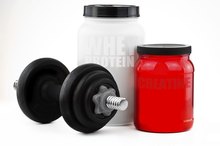What does fact checked mean?
At Healthfully, we strive to deliver objective content that is accurate and up-to-date. Our team periodically reviews articles in order to ensure content quality. The sources cited below consist of evidence from peer-reviewed journals, prominent medical organizations, academic associations, and government data.
- Nutrition & Metabolism: Effects of Capsinoid Ingestion on Energy Expenditure and Lipid Oxidation at Rest and During Exercise
- Nutrition & Metabolism: Effects of Capsinoid Ingestion on Energy Expenditure and Lipid Oxidation at Rest and During Exercise
- National Institutes of Health: Dietary Supplement Fact Sheet: Vitamin D
- Hormone and Metabolic Research: Effect of Vitamin D Supplementation on Testosterone Levels in Men
- Hormone and Metabolic Research: Effect of Vitamin D Supplementation on Testosterone Levels in Men
- Journal of the International Society of Sports Nutrition: Effects of Supplemental Fish Oil on Resting Metabolic Rate, Body Composition, and Salivary Cortisol in Healthy Adults
- Journal of the International Society of Sports Nutrition: Effects of Supplemental Fish Oil on Resting Metabolic Rate, Body Composition, and Salivary Cortisol in Healthy Adults
- National Institutes of Health Office of Dietary Supplements: Zinc
- Neuro Endocrinology Letters: The Effect of Exhaustion on Thyroid Hormones and Testosterone Levels of Elite Athletes Receiving Oral Zinc
- Neuro Endocrinology Letters: The Effect of Exhaustion on Thyroid Hormones and Testosterone Levels of Elite Athletes Receiving Oral Zinc
- International Journal of Food Science Nutrition: Medium-Chain Triglycerides are Advantageous in promoting Weight Loss Although Not Beneficial to Exercise Performance
- International Journal of Food Science Nutrition: Medium-Chain Triglycerides are Advantageous in promoting Weight Loss Although Not Beneficial to Exercise Performance
The information contained on this site is for informational purposes only, and should not be used as a substitute for the advice of a professional health care provider. Please check with the appropriate physician regarding health questions and concerns. Although we strive to deliver accurate and up-to-date information, no guarantee to that effect is made.
Foods That Aid Fat Lipolysis
Although many fat-burning supplements are available, it is possible to burn fat and lose weight through diet and exercise alone. Eating too much of any food will result in fat gain, but certain foods do contain nutritional characteristics that encourage lipolysis, or fat-burning. No matter what foods you eat, you will still need to maintain a calorie deficit to lose weight. Consult a doctor prior to starting any diet plan.
Chili Peppers
Chili peppers, which include:
- the serrano
- paprika
- jalapeno
- habenero varieties
- contain chemical compounds called capsinoids
- which impart the spicy flavor to these foods
In addition to offering pungent flavor, capsinoids can aid in your fat loss goals. Capsinoids can promote increases in your rate of calorie burning and promote increased fat burning, according to a study published in the August 2010 edition of "Nutrition & Metabolism."
Soybeans
Whey & Testosterone
Learn More
Soybeans are a rich source of protein and carbohydrates and are used to make soy protein, a common ingredient in weight management and meal replacement shakes. Soybeans themselves can be healthy, as they are rich in the amino acid leucine. According to research published in the June 2007 issue of "Diabetes," a high intake of leucine can promote increased fat burning. The study states that leucine helped prevent weight gain with increased food intake, and promoted weight loss without decreased food intake.
- Soybeans are a rich source of protein and carbohydrates and are used to make soy protein, a common ingredient in weight management and meal replacement shakes.
- According to research published in the June 2007 issue of "Diabetes," a high intake of leucine can promote increased fat burning.
Salmon
Salmon can be a particularly beneficial food for enhancing fat burning, as it is rich in vitamin D and omega-3 fatty acids. According to research published in the March 2011 issue of "Hormone and Metabolic Research," increased vitamin D intake can promote increased levels of testosterone, which can enhance lipolysis 5. Meanwhile, a study from the October 2010 issue of "Journal of the International Society of Sports Nutrition" found that omega-3 fatty acids could promote increased fat loss and increased muscle gain.
Oysters
Supplements that Suppress the Appetite
Learn More
Oysters are rich in protein and low in fat and carbohydrates, so they can be used on a variety of diet plans. Additionally, oysters are among the best food sources of zinc. According to a study published in the February-April 2006 edition of "Neuro Endocrinology Letters," increasing zinc consumption can lead to increased testosterone levels 8.
Coconut Oil
Coconut oil is a calorie-dense, high-fat liquid derived from the pulp of coconuts. Although the fats in this oil are not omega-3 fatty acids, they can be beneficial; coconut oil is a rich source of medium-chain triglycerides 9. According to research published in the November 2010 issue of "International Journal of Food Sciences and Nutrition," medium chain triglycerides can increase fat burning and help you lose weight by encouraging a reduced food intake 9.
Related Articles
References
- Nutrition & Metabolism: Effects of Capsinoid Ingestion on Energy Expenditure and Lipid Oxidation at Rest and During Exercise
- Diabetes: Increasing Dietary Leucine Intake Reduces Diet-Induced Obesity and Improves Glucose and Cholesterol Metabolism in Mice via Multimechanisms
- USDA National Nutrient Database: Soybeans, Green, Cooked, Boiled, Drained, Without Salt
- National Institutes of Health: Dietary Supplement Fact Sheet: Vitamin D
- Hormone and Metabolic Research: Effect of Vitamin D Supplementation on Testosterone Levels in Men
- Journal of the International Society of Sports Nutrition: Effects of Supplemental Fish Oil on Resting Metabolic Rate, Body Composition, and Salivary Cortisol in Healthy Adults
- National Institutes of Health Office of Dietary Supplements: Zinc
- Neuro Endocrinology Letters: The Effect of Exhaustion on Thyroid Hormones and Testosterone Levels of Elite Athletes Receiving Oral Zinc
- International Journal of Food Science Nutrition: Medium-Chain Triglycerides are Advantageous in promoting Weight Loss Although Not Beneficial to Exercise Performance
Writer Bio
Brian Willett began writing in 2005. He has been published in the "Buffalo News," the "Daytona Times" and "Natural Muscle Magazine." Willett also writes for Bloginity.com and Bodybuilding.com. He is an American Council on Exercise-certified personal trainer and earned a Bachelor of Arts in journalism from the University of North Carolina.









